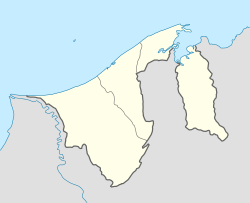Kampong Batang Perhentian
Batang Perhentian | |
|---|---|
| Kampong Batang Perhentian | |
| Coordinates: 4°45′45″N 114°48′44″E / 4.7626°N 114.8122°E | |
| Country | Brunei |
| District | Brunei-Muara |
| Mukim | Pengkalan Batu |
| Area | |
| • Total | 124.85 ha (308.51 acres) |
| Population (2016)[1] | |
| • Total | 348 |
| • Density | 280/km2 (720/sq mi) |
| Time zone | UTC+8 (BNT) |
| Postcode | BH1523 |
Kampong Batang Perhentian (Malay: Kampung Batang Perhentian) or simply known as Batang Perhentian, is a village in the south-west of Brunei-Muara District, Brunei. The population was 348 in 2016.[1] It is one of the villages within Mukim Pengkalan Batu. The postcode is BH1523.[2][3]
Etymology
[edit]The name Batang Perhentian comes from a large log as a sign where people stop before continuing their journey.[4]
Demography
[edit]As of 2014, Kampong Wasan and Batang Perhentian were inhabited by 655 residents consisting of 316 males and 339 females. Most of the people in this village work for the government, in addition to growing rice and gardening themselves. There are a total of 86 houses in this village and most of them belong to the Kedayan tribe. There are 38 elderly people in this village. Although the position of this village is far from the urban area, this village is not exempt from receiving basic facilities as enjoyed in other villages.[4]
References
[edit]- ^ a b "Population and Housing Census Update Final Report 2016" (PDF). www.deps.gov.bn. Department of Statistics. December 2018. Retrieved 20 July 2021.
- ^ "Buku Poskod Edisi Kedua (Kemaskini 26 Disember 2018)" (PDF). post.gov.bn (in Malay). Brunei Postal Services Department. 26 December 2018. Retrieved 20 July 2021.
- ^ "Kampong Batang Perhentian, Pengkalan Batu, Brunei Muara: BH1523". brn.postcodebase.com. Retrieved 28 August 2018.
- ^ a b KOMPILASI RENCANA KNK 2014 (PDF) (in Malay). Kenali Negera Kitani. 2014. pp. 105–110.

